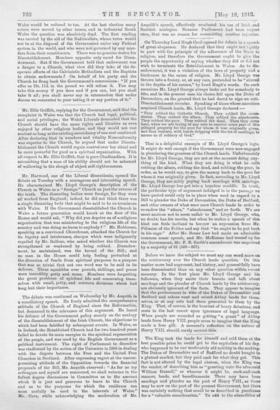The debate was continued on Wednesday by Mr. Asquith in
a conciliatory speech. He freely admitted the comprehensive attitude of the Church of England since the Reformation, but demurred to the relevance of this argument. He based his defence of the Government policy mainly on the analogy of the disestablishment of the Irish Church, the objections to which had been falsified by subsequent events. In Wales, as in Ireland, the Established Church had for two hundred years failed to devote its main energies to the spiritual regeneration of the people, and was used by the English Government as a political instrument. The right of Parliament to disendow was vindicated by the action of the Unionists in 1905 in dealing with the dispute between the Free and the United Free Churches in Scotland. After expressing regret at the uncom- promising attitude of the Opposition towards the financial proposals of the Bill, Mr, Asquith observed " As far as my colleagues and myself are concerned, we shall welcome in the fullest degree discussions in Committee as to the amount which it is just and generous to leave to the Church and as to the purposes for which the residuum can most usefully be used in the interests of Wales." Mr. Cave, while acknowledging the moderation of Mr. Asquith's speech, effectively combated his use of Irish and Scottish analogies. Because Parliament had been unjust once, that was no reason for committing another injustice.










































 Previous page
Previous page